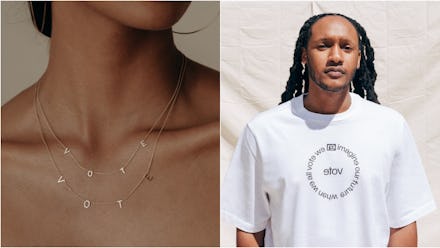Voting is having a fashion moment

As she often does, Michelle Obama incited a style trend with her appearance at the Democratic National Convention on August 17. The former first lady delivered a rousing speech, encouraging Americans to vote in the coming election, and she accessorized her message with a simple gold chain and charms spelling: V-O-T-E. The necklace went viral, immediately spawning knock-offs, but the popularity of Obama’s civic-minded jewelry highlights a striking sartorial trend: as Americans brace for a divisive and potentially very fraught general election this November, fashion and democracy are more entwined than ever before.
You’re likely to see all sorts of pro-voting messaging scrawled on t-shirts, tote bags, and face masks this fall, hawked by fast fashion giants and indie retailers alike. The real “Vote” necklace is by Jamaican-born jewelry designer Chari Cuthbert of ByChari. But before you run out and buy a $30 copy of her design on Etsy, you should know Cuthbert is threatening legal action against the “nefarious and opportunistic” retailers profiting off her newfound popularity. The knock-off “Vote” necklace saga highlights another important aspect of the political fashion trend. The cause or business you support by buying pro-democracy apparel is as important as the message you promote.
Many designers and retailers are on the same page, having recognized that the events of 2020 — from coronavirus, which has crippled small businesses and bankrupted legacy brands, to protests for racial equality — demand greater responsibility from the powerful fashion industry. Abrima Erwiah, the co-creator of Studio 189, a sustainable fashion brand based in Ghana, told the New York Times that when she noticed gathering calls for change towards the start of the pandemic, she realized “that it was all meaningless if we didn’t also participate in what is going on right now with the election and our communities.”
So Erwiah called up her friend Rosario Dawson, the actress, activist, and other co-creator of Studio 189, and they cooked up an initiative called Fashion Our Future 2020, a social media campaign encouraging voter registration, backed by a capsule collection of pro-democracy accessories designed by famous creatives. Virgil Abloh, the force behind Off-White and menswear at Louis Vuitton, is its creative director. He designed a simple t-shirt for FOF reading “Model Voter” flanked by quotation marks. Other big names who designed products for the initiative include Proenza Schouler, Rachel Comey, and Khloe Kardashian’s Good American.
Obama’s longtime stylist, Meredith Koop, the woman responsible for the viral “Vote” necklace, is also wading further into sartorial politics. She worked with Dover Street Market, owned by Comme des Garçons, to commission pro-democracy products in partnership with When We All Vote, an organization founded during the 2018 midterm elections that’s co-chaired by the former first lady. Dover Street Market enlisted around 25 of its buzziest brands and partners, like Hood by Air, Selena Gomez, and Marc Jacobs, to make unique accessories for the project. There’s even a pair of “canvassing sneakers” on offer from indie footwear brand Brother Vellies. The brief was to transcend basic merch and inspire young people to action. “I was tired of a gray T-shirt with a logo on it,” Koop told the New York Times. “I thought we could do something better.”
Fashion’s embrace of politics is relatively new. Just four years ago, during the 2016 election, austere publications like Vogue made history by endorsing Hillary Clinton for president. Trump’s election left many in the industry morose, but 2020 has altered how people approach style in numerous ways. For one thing, there’s not much to get dressed for anymore, when being a good samaritan mandates staying home most of the time. Similarly, the September fashion week(s) will feel radically different this year, with lots of designers opting for audience-less digital shows. In that vein, the creatives behind Fashion Our Future and When We All Vote envision a new attitude towards special outfits. “We want people to think: Oh my God, what am I going to wear to the polls?” Dawson told the New York Times.
“Everyone is sitting at home in sweatpants. Why not get dressed up for voting?” Erwiah added. “Watch the election like we watch the Oscars. This date could be like the Grammys. Turn up for the turn out!”